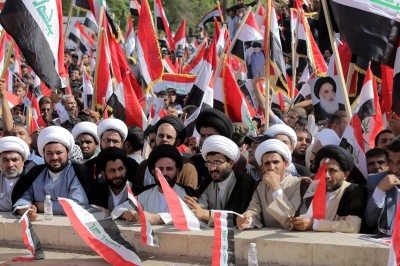US Seeks to Reoccupy Iraq. Going After the Islamic State and the “Anti-ISIL Coalition”

American political analyst Soraya Sepahpour-Ulrich says the United States is seeking to reoccupy Iraq and re-establish itself in the Persian Gulf region through its anti-ISIL coalition.
Ulrich, who is an independent researcher, public speaker and writer with a focus on US foreign policy, made the remarks in an interview with Press TV on Tuesday.
On Monday, the Pentagon announced that the US and its allies have started airstrikes against ISIL in Syria. Fighter aircraft from Saudi Arabia, Jordan, Qatar, Bahrain and the United Arab Emirates took part in the airstrikes. The United States has already conducted dozens of airstrikes against ISIL targets in Iraq since mid-August.
“I also believe that this is a deliberate move. If the so-called coalition was serious in getting rid of these terrorists, they would not be sending more arms and more money to fund the so-called moderate terrorists,” Ulrich said. “I’m not sure how they can distinguish one from another.”
“And furthermore the neighboring countries, the coalition, would not be buying the oil that they [ISIL] are stealing from the countries they have occupied — Syria and Iraq,” she added.
“So they are in league with these terrorists and the whole purpose of this is to enable the United Sates to bomb Iraq, and to bomb Syria and to reoccupy Iraq and to get rid of [Syrian President Bashar] Assad,” the activist stated.
“Now the United States and its allies have a carte blanche to attack and invade bomb and any country that they deem to call terrorist,” Ulrich noted.
The ISIL terrorists, who were initially trained by the CIA in Jordan in 2012 to destabilize the Syrian government, control large parts of Syria’s northern territory. ISIL sent its fighters into Iraq in June, quickly seizing vast expanse of land straddling the border between the two countries.
According to reports, ISIL is currently in control of seven oil fields in Iraq and large amounts of the country’s wheat supplies.
The output capacity of the ISIL-held oil fields amounts to 80,000 barrels a day, said the International Energy Agency (IEA) in a monthly oil market report last month.
The potential oil flow from Iraq’s ISIL-held deposits is commensurate to about $8.4 million a day on international markets.
In an another interview with Press TV last month, Ulrich said the United States has raised the specter of ISIL in order to stay in Iraq and the Middle East region for a long time.
She said that “America had long-standing plans to be permanently present in Iraq, and in the Persian Gulf region as a whole. Domination of the Persian Gulf is the lynchpin of US strategy…the presence of ISIL helps them in this goal.”
“It’s very interesting that ISIL has captured towns and regions that have been vital for the US policy in the region — one is the oil-rich [region],” Ulrich said on August 11. “And the other more important aspect…, according to my perspective, is the water factor, and ISIL managed to capture the dams.”
Copyright Press TV, 2014

